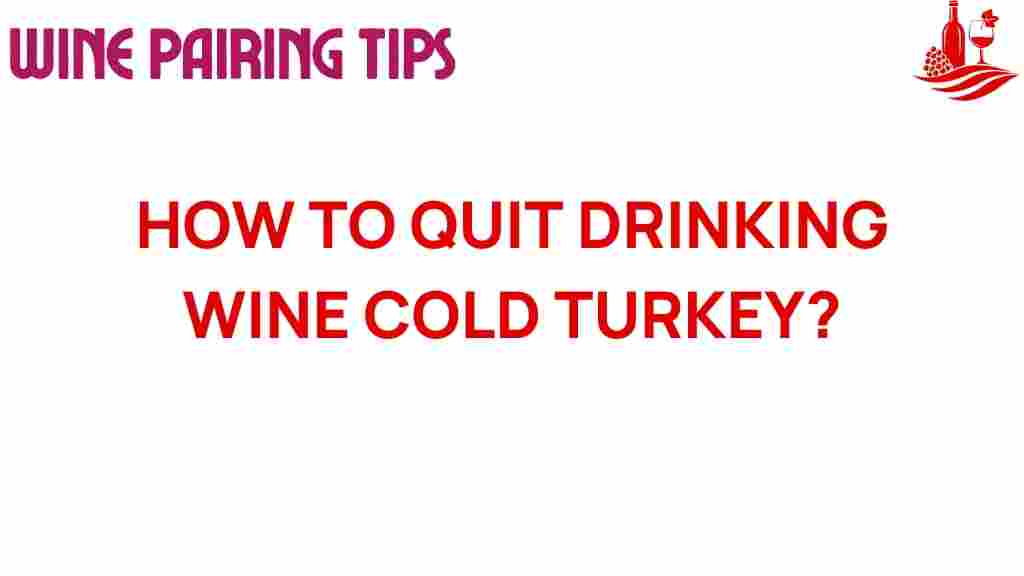The Cold Turkey Challenge: How to Quit Drinking Wine
Quitting alcohol can be a life-changing decision, particularly when it comes to wine, a beloved beverage for many. The Cold Turkey Challenge refers to the method of stopping drinking abruptly, rather than gradually reducing intake. For those looking to embrace sobriety, this challenge can be a powerful step towards self-improvement and better mental health. In this article, we will explore effective strategies to quit drinking wine, the benefits of an alcohol-free lifestyle, and tips for successful addiction recovery.
Understanding the Motivation to Quit Drinking Wine
Before embarking on your journey to quit drinking wine, it’s essential to understand why you are choosing this path. Identifying your motivations can reinforce your commitment. Here are some common reasons why people decide to quit:
- Health Benefits: Reducing alcohol consumption can lead to improved physical health, weight loss, and better sleep.
- Mental Clarity: Many find that sobriety enhances their mental health and cognitive function.
- Financial Savings: Cutting out wine can significantly reduce your monthly expenses.
- Improved Relationships: Sobriety can help strengthen personal connections and family dynamics.
Preparing for the Cold Turkey Challenge
Preparation is crucial for success in your journey to quit drinking wine. Here are some steps to help you get ready:
- Set Clear Goals: Define what sobriety means to you. Are you aiming for total abstinence or a limited amount of wine? Document your goals.
- Educate Yourself: Read about the benefits of quitting alcohol and the potential challenges you may face. Knowledge is power.
- Identify Triggers: Recognize situations, people, or emotions that trigger your desire to drink. This awareness will help you navigate challenges.
- Build a Support System: Talk to friends, family, or support groups about your decision. Having a support network can dramatically increase your chances of success.
The Step-by-Step Process to Quit Drinking Wine
Now that you are prepared, let’s dive into the step-by-step process to quit drinking wine cold turkey.
Step 1: Commit to Your Decision
Make a firm commitment to quit drinking wine. Write a pledge or a letter to yourself outlining your reasons for quitting and how you expect your life to improve. Keep this document handy for motivation.
Step 2: Remove Temptations
Clear your home of any wine or alcohol. Stock your fridge and pantry with alcohol-free beverages, such as sparkling water, herbal teas, and juices. This will reduce the temptation to drink.
Step 3: Create a New Routine
Replace your wine-drinking rituals with healthier habits. Here are some ideas:
- Exercise: Engage in physical activities you enjoy, which can help boost your mood and reduce cravings.
- Meditation and Mindfulness: Practice mindfulness techniques to manage stress and anxiety.
- New Hobbies: Explore new interests or hobbies that keep you engaged and distracted from the urge to drink.
Step 4: Find Alternatives
Discover alcohol-free alternatives that can satisfy your cravings without the negative effects of alcohol. Consider:
- Alcohol-free wines and beers
- Mocktails with fresh fruit and herbs
- Sparking water with lemon or lime
Step 5: Monitor Your Progress
Keep track of your journey. Journaling can be an effective way to reflect on your feelings and experiences as you quit drinking wine. Document your successes, challenges, and what you learn along the way.
Troubleshooting Tips for Common Challenges
As with any lifestyle change, you may face challenges during your journey to quit drinking wine. Here are some common issues and tips to overcome them:
Challenge 1: Cravings
Cravings can be intense, especially in the early days. Here’s how to manage them:
- Distract yourself with a fun activity or hobby.
- Practice deep breathing exercises to reduce anxiety.
- Drink water or herbal tea to stay hydrated.
Challenge 2: Social Situations
Being in social settings can be challenging when you quit drinking wine. Consider these strategies:
- Be honest with friends about your decision to quit.
- Attend gatherings with a non-alcoholic drink in hand.
- Seek out social events that do not revolve around drinking.
Challenge 3: Emotional Triggers
You may find yourself tempted to drink during stressful or emotional situations. Here’s how to cope:
- Identify what triggers your emotions, and develop a plan to address them without alcohol.
- Reach out to your support system for encouragement.
- Engage in activities that promote emotional well-being, such as exercise or art.
Benefits of an Alcohol-Free Lifestyle
Choosing to quit drinking wine can lead to numerous benefits, enhancing both your physical and mental health:
- Improved Physical Health: Your liver and heart can recover, and you are less likely to develop alcohol-related diseases.
- Enhanced Mental Clarity: Many report feeling more focused and mentally sharp after quitting alcohol.
- Better Sleep: Alcohol can disrupt sleep patterns; quitting can lead to more restful nights.
- Improved Mood: Sobriety often results in a more stable emotional state.
Maintaining Sobriety: Long-Term Strategies
Once you’ve successfully completed the Cold Turkey Challenge, the next step is maintaining your sobriety. Here are some long-term strategies:
- Continue Educating Yourself: Stay informed about the effects of alcohol and the benefits of sobriety.
- Participate in Support Groups: Groups like Alcoholics Anonymous (AA) can provide continuous support and accountability.
- Stay Engaged in Healthy Activities: Keep pursuing hobbies and interests that promote a healthy lifestyle.
Conclusion: Embrace Your New Lifestyle
Quitting drinking wine through the Cold Turkey Challenge can be a daunting yet rewarding journey. By following the steps outlined in this article and employing the provided sobriety tips, you can successfully transition to an alcohol-free lifestyle. Remember, every day is a step towards improved mental health and self-improvement. Celebrate your progress and embrace the positive changes that come with sobriety.
For more resources on addiction recovery, consider visiting this informative site. If you’re looking for community support, check out local support groups that can guide you through your journey.
This article is in the category Tips and created by Wine Pairing Tips Team
